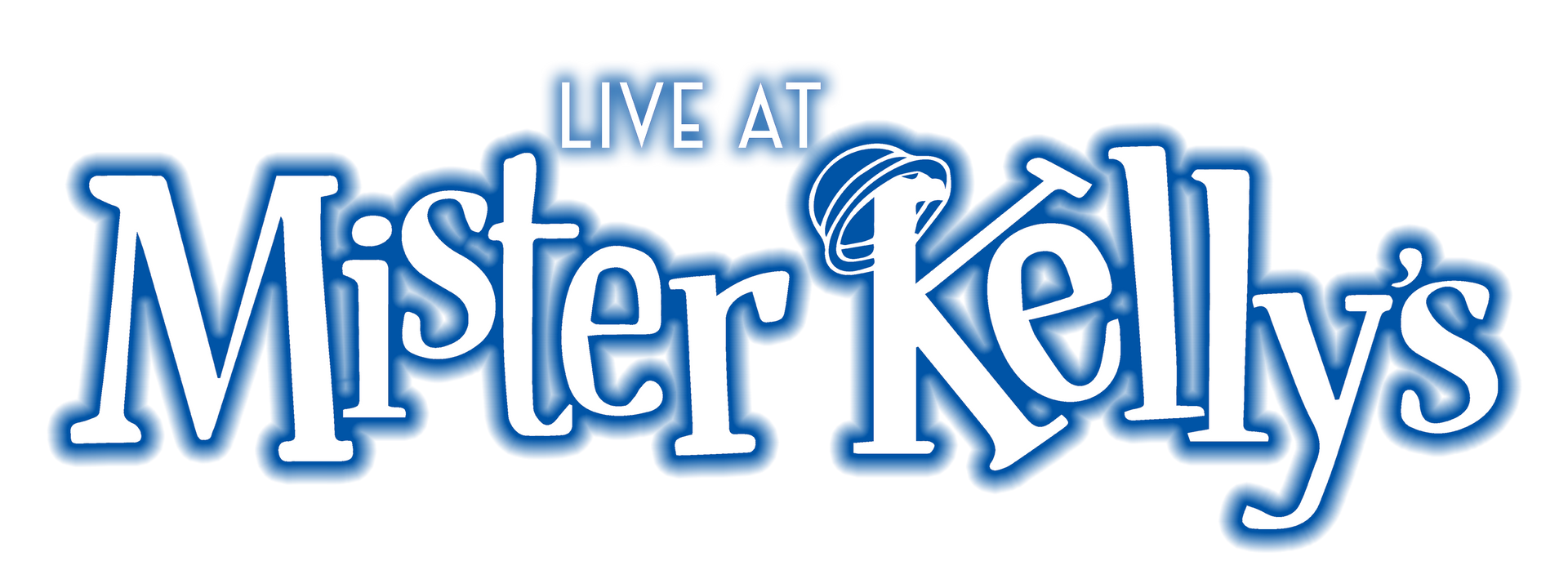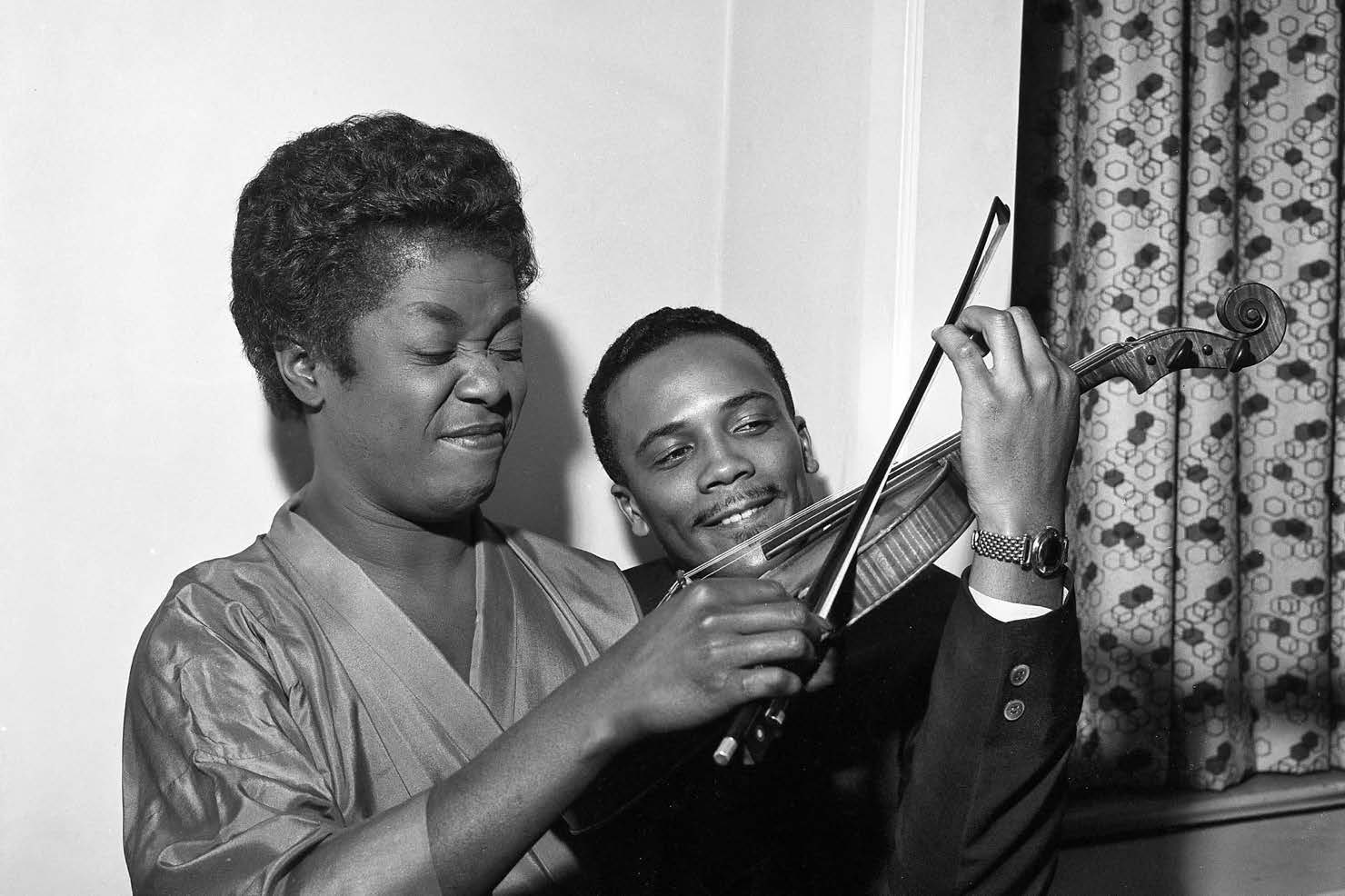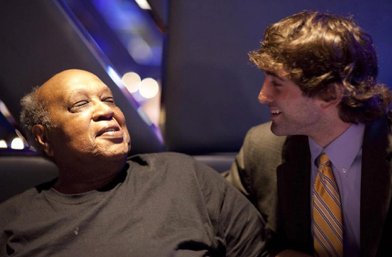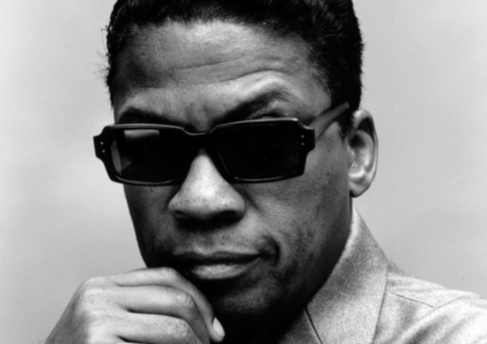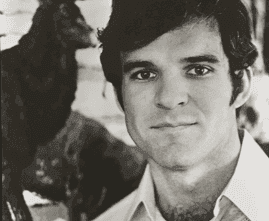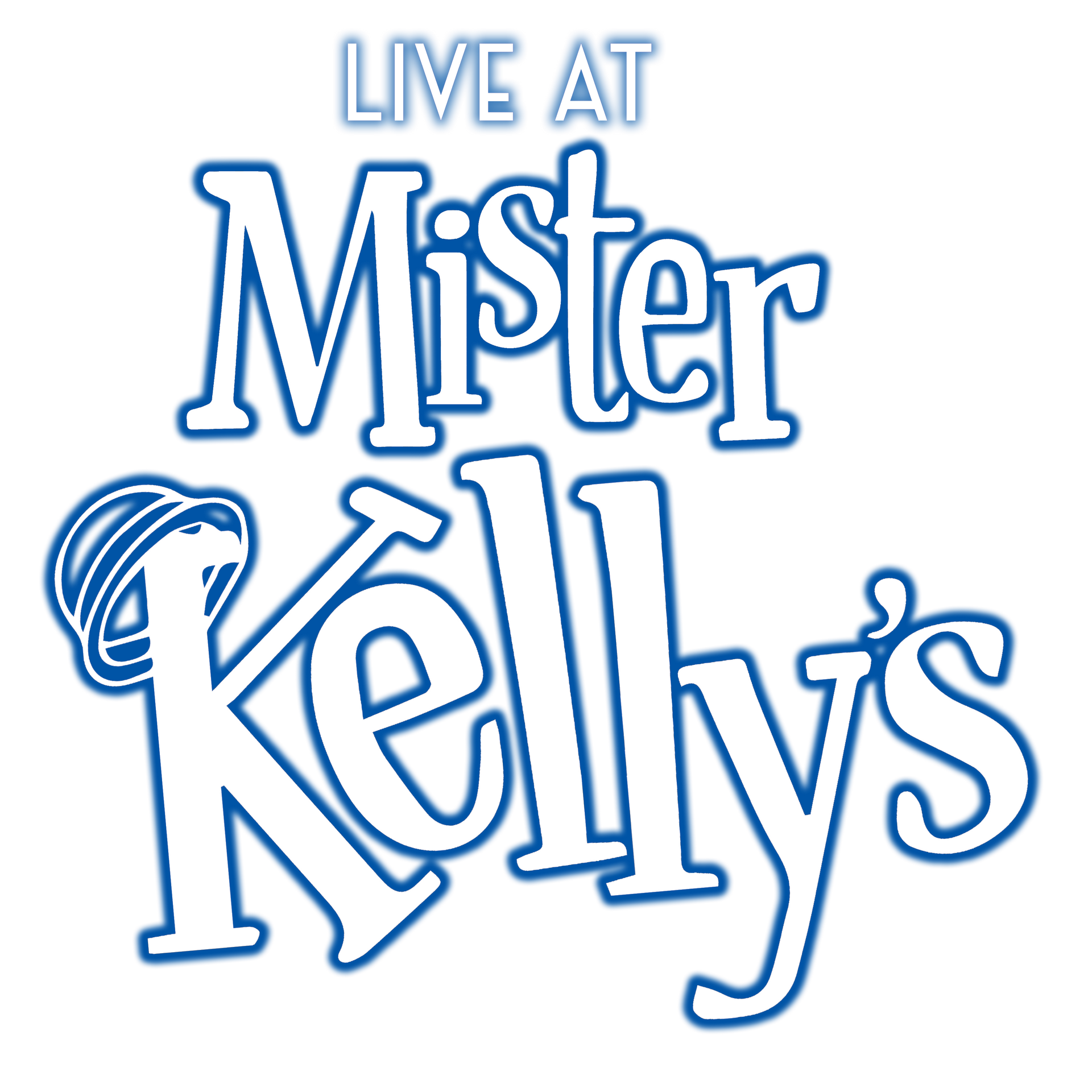Guest Blog by Eric F. James: The Marienthals Launch a Shooting Star!
- By David Marienthal and Tory Foster
- •
- 20 Apr, 2017
- •
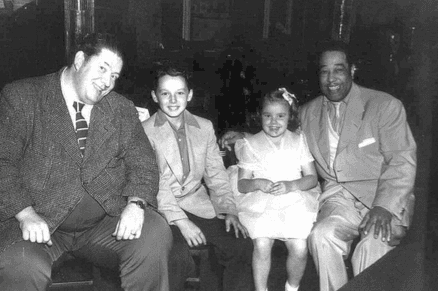
Am I the only one to receive a Marienthal brothers’ college scholarship? Or did I kill their scholarship program?
Who knew that George & Oscar Marienthal established a scholarship fund for aspiring performers? Not George Marienthal’s son David. When I asked David, he knew nothing about it. I had to explain being the only known Marienthal scholar.
Fresh out of St. Ignatius College Prep in 1960 I held a college scholarship in theater to Loyola University.
In Iggy’s halls, I often gazed upon Bob Newhart’s 1945 class photo. Fourteen years later, Bob was getting
hot as a writer and nightclub comedian. I aspired to be just as hot as Bob, maybe hotter, even sooner.
Loyola U. was no incubator of theatrical talent. The university hid away its theater department in the old offices of a gym. The only standout in my acting class was JoAnn Henner, a classically beautiful, tall, busty ballerina. She left my unrequited heart longing and lusting. It was JoAnne’s sister, though, who had the flash and energy of a starburst. When Marylu Henner became a nationally recognized television star, Loyola took credit.

I was no standout like the Henner sisters. I leaned more to English literature; French, Latin, and Greek languages, with electives in Aristotelian logic and philosophy. How that would make me hotter and better than Bob Newhart, I had no idea. I was aiming high.
Talent in the Raw
On a January night in a freezing blizzard, I met Berenicki Robbins around midnight on the Michigan Avenue Bridge. Rejected by a wispy blond who I tricked into coming to the city and meeting me at the Illinois Central Station for a blind date, my next move was to jump into the Chicago River. Timing the approaching ice flows, I prepared to jump headfirst, be knocked out, and washed unconscious into hypothermia. I soon would disappear into the eternal graveyard of Lake Michigan. Cautiously climbing up on the railing, a furry force from nowhere suddenly knocked me down into a pile of slush.
“What do you think you’re doing,” the voice barked down to me.
“Ending it all,” I hopelessly grumbled. “I am an actor. I can do anything I want.”
“Get up and get off this bridge. Wait for me at the end.”
Good actor that I was, I followed direction precisely, sulking into the brilliant lights of the Wrigley Building. I waited. The form grew larger as it approached. It was a woman in a fur coat.
“Are you really an actor?” I nodded my head. “I’m dropping off some press releases at the Sun-Times for a show I’m producing. Come with me. I’ll introduce you.”
Being midnight, there was no one to meet in the office of Glenna Syse, the Times’ theater columnist. Nicki invited me for coffee on the catwalk of the Times’ presses. My life was about to take a turn.
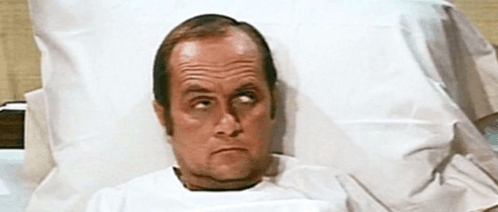
Coffee turned into a Newhart-style psychiatric session. I dryly poured out the drama of my angst, growing up in Bridgeport, living in the dismal projects, and over-protected by a single mom. Logically, my ready solution was simple. I had to get out from under it all by becoming famous. Oh yes, I insisted, I also was Chicago’s greatest undiscovered actor.
Not laughing at me, Nicki Robbins schooled me in living a creative life.
“Look down there.” I looked down into the pit of the Sun-Times presses, grinding out the morning’s edition under a noisy din. “What do you see?”
“Just a bunch of men doing boring work,” I replied. “Nobody knows who they are.” I noted their black oil slick aprons, their funny newspaper hats, their hands and faces all ink stained and smudged. “They’re just workers. I have something special to offer. I’m an actor.”
“They are much more than workers,” Nicki corrected me. “Everything each worker does, and how well they do it, is meaningful. Each one of them connects with an audience. If those workers did not show up, day to day, and do what you call boring work, the people of Chicago would never know what’s going on in the world.” Nicki let that sink in.
“Are you free Monday night?” I nodded yes. “Come to this address downtown. Be prepared with a three-minute monologue. A professional director, and the best professional actors working in Chicago, will judge you. If you are as good as you think, you might get to join them.” My fortune seemed dreamy and unreal. “Go home.”
Into Stellar Orbit
Nicki was not kidding. On Monday night, I met Aviva Crane, a founder of Chicago’s prestigious Sarah Siddons Award for acting. Next through the door came June Travis. She was a Hollywood actress, studio groomed to become a star. June’s father was VP of the Chicago White Sox. If June was not beauty enough, in slinked Jean Peters, Chicago’s own Marilyn Monroe.
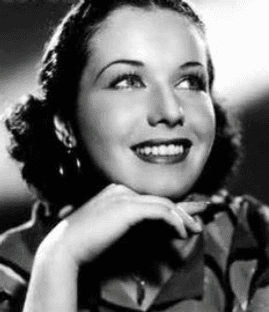
It turned out Nicki was a schoolteacher with a dream of schooling professional actors. Among others attending her Chicago Foundation for Theater Arts was a black teacher from brainy Hyde Park. He had a similar dream to teach professional acting to his disadvantaged high school students.
Leading them all was Nicki’s director, a Nero type to give my carefully prepared monlogue his thumbs up or thumbs down. Les Weinrot was a Chicago radio star. He sported a dapper moustache. No room was big enough to contain his flamboyant ego. His creative prowess also made him wealthy, as a powerhouse advertising exec at J. Walter Thompson.
Each actor performed as the night sped on. Weinrot fawned over every one of them, nurturing and cultivating each one as if they were his children. Weinrot ignored me. I was not one. I fidgeted, waiting my turn. “Ok, see everyone next week,” Weinrot suddenly announced. My heart fell. I must have shown it. Weinrot noticed.
“Wait everybody. Sit down.” Weinrot turned to me. “Kid, weren’t you supposed to do something?”
My three-minute monologue was shattered in a flash. Ten seconds in, Weinrot stopped me. “No. Do it this way.” I did. He stopped me again, “No. Do this instead.” A couple more tries and Weinrot cut me off altogether. “Ok, everyone, see you next week.”
Waiting in the cold for my bus on State and Randolph, I was despondent, feeling more deeply foolish than when Berenicki discovered me on the bridge. Weinrot exited the State-Lake building with Travis on his arm. In the middle of his exuberant strut and grand gestures, he spotted me. “Wait a minute,” he said to June. He approached and looked strangely at me, as if I was a shop window curiosity. “I don’t know what you’ve got, kid. You come back next week.”
I was the only teenager to attend Les Weinrot’s class of professional actors. Some nights I played Simon Bolivar. Other nights, I played love scenes with Aviva Crane and Jean Peters. Soon, Carl Stohn Jr. cast me in a play with Maureen O’Sullivan at the Drury Lane Theater. Within months, I got my Equity union card. I was performing in industrial shows and films with my SAG union card. I was a working professional actor, but still going to school.
Marienthals Launch My Scholarship
Nicki was aware my scholarship to Loyola was about to end. One night, she handed me an appointment card. “Go see these people.” She said not another word.
“These people” were Bella Itkin and John Reich of the Goodman Theater. I thought I was auditioning for a play. They kept asking me about my studies at Loyola. A week later, I got a call back. “You are accepted. You start in the next term. Here are your scholarship papers. Sign here.”
I immediately recognized the Marienthal brothers name as patrons of my scholarship to the School of the Art Institute. My single mom was a cocktail server at the Blue Note, a downtown jazz nightclub owned by Frank Holtzfiend. The Marienthals and Holtzfiend were giants and sporting competitors of the Chicago jazz scene. Behind their competition, they were friends, at least until the Marienthals hired away Sarah Vaughn. Holtzfiend could not match her better pay.
If Frank Holtzfiend put food on my table at home, the Marienthals placed serious opportunity in my path. Their support could launch me to stardom, as it did with Sarah Vaughn, Bob Newhart, or Shelly Berman.
Following my first studio test productions at Goodman, I performed on Goodman’s main stage in a blockbuster hit - Shakespeare’s King Lear, starring Morris Carnovsky. June Travis was cast as Lear’s daughter Goneril. Maurice Copeland, a regular performer on WGN, played the Earl of Gloucester. I played his son Edgar. If this production was good enough for Travis and Copeland, it was good enough for me.
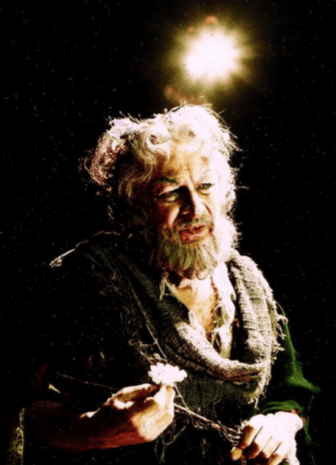
Carnovsky was a product of the Yiddish theater. His creation of Lear won accolades in New York. I informed Carnovsky I once acted with his associate in the Yiddish theater, Luther Adler. When Adler came to Chicago to film a TV episode of Route 66, Nicki Robbins made sure all of her students could grab a national TV credit and some needy professional pay. I never told Carnovsky I performed with Adler as “atmosphere,” the blithe term for a background extra.
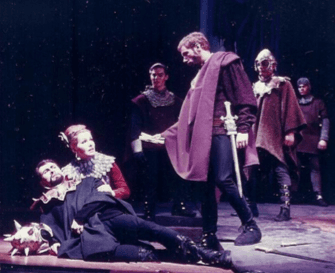
My best grades at Goodman were in costume design and set design, talents I never knew I had. In my other classes, I remained impatient, and uninspired. Although I earned respectable grades, I surely was a restless pain to some of my Goodman teachers.
Goodman soon gave me a starring role of my own. Edward Albee’s play Ballad of the Sad Café did not succeed on Broadway. Albee wanted to correct its shortcomings. He rewrote the play for Goodman’s production.
I was thrilled to play Marvin Macy. Even better, my very good friend Gretchen Oehler played opposite me as Miss Amelia. Gretchen had a Sarah Siddons Scholarship. She later went on to soap opera stardom on Another World. We were kindred orphans, we thought, insufficiently recognized for our unique talent. Neither of us could be pegged. No doubt, Albee felt the same about his play. Gretchen and I turned that around. Ballad of the Sad Café was a Goodman hit.
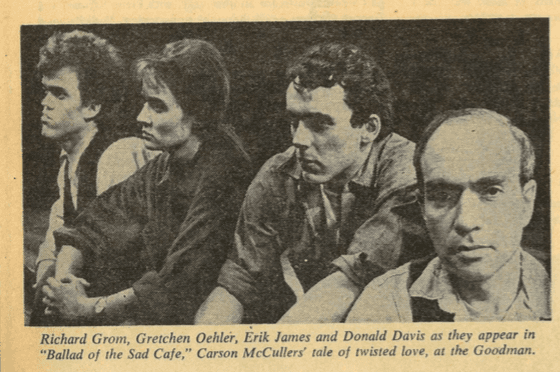
Minor roles in other Goodman productions offered me little sustenance. Sam Wanamaker arrived to play Othello. His backstage antics wooing his paramour Jan Sterling were more entertaining. Later in Los Angeles, Wannamaker’s brother became my doctor.
Fireworks erupted when the late Joe Slowick cast me as the son in Mother Courage, starring the Russian- born actress Eugenie Leontovich. The legendary Stanislavski taught acting to Leontovich. I studied under Leontovich. The opportunity was not one to miss. I learned little about Stanislavski acting under Leontovich, but I did learn how to battle the megalomania of “star power.”
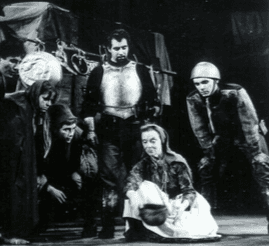
Leontovich and I bedeviled and be-damned one another. Ranting in her native Russian that no one could understand, she fired me from Mother Courage. Slowick kept me in the play in a lesser role. Offstage In acting class, Leontovich retaliated and gave me a “D.”
The next year, when I performed at Pheasant Run Theatre I invited Leontovich to come see my starring performance. As we drove out of the bright city on a dark country road towards St. Charles, Leontovich grew agitated. I was sure she suspected an evil, if not criminal reprisal. She relaxed when the brightly lit theatre finally appeared from the darkness. Dinner theater impresario Carl Stohn Jr. introduced Leontovich to a capacity house. The audience gave her a standing ovation. Leontovich was utterly stunned. I had introduced the Russian actress to the average person’s theater in America heartland, a theater that she never experienced anywhere before. For that one night, we were friends.
A Shooting Star
Did I kill the Marienthal brothers’ scholarship program? Maybe so.
I lasted only a year at Goodman. I told John Reich I would not return for the second year. I recommended someone else should receive the balance of my Marienthal brothers’ scholarship. A couple teachers tried to convince me to stay. I explained my dissatisfaction with the classes, but not the productions. While at Goodman, I was missing professional acting opportunities. I wanted to be free to go to work. I dropped out.
Like the press operators at the Sun-Times, I showed up to work in play after play. Fading stars became my guiding lights – Pat O’Brien, Howard Duff, Phyllis Kirk, Edgar Bergen, Virginia Graham, William Bendix, Johnny Desmond, Imogene Coca, Edward Everett Horton, Joan Bennett, Tab Hunter, Joan Crawford’s daughter Christina Crawford, Phyllis Diller’s husband Ward Donovan, Rudy Vallee, Linda Darnell, John Conte, Morey Amsterdam, Gary Conway, Don DeFore, and Theresa Wright to name a few.

I proposed marriage to Delia Sheen, a niece of another television celebrity. Bishop Fulton J. Sheen of Peoria, Delia’s uncle who married us, often bested TV’s Milton Berle in the ratings. The William Morris Agency soon knocked on my door. Delia and I honeymooned in Broadway’s theater district. Soon after, we moved from Chicago to New York.
Tom Ewell, famous for the Seven Year Itch with Marilyn Monroe, thought I should play a young male lead in his Broadway road tour of Take Her, She’s Mine. I grabbed the role. Tom and I became lifelong friends. I was not so friendly with Hans Conried when we did a Broadway road tour of Generation. “Uncle Tounoose” brought along his friend from the I Love Lucy TV show, Jerry Hausner. Performing with Hans and Jerry felt like time traveling through vaudeville.
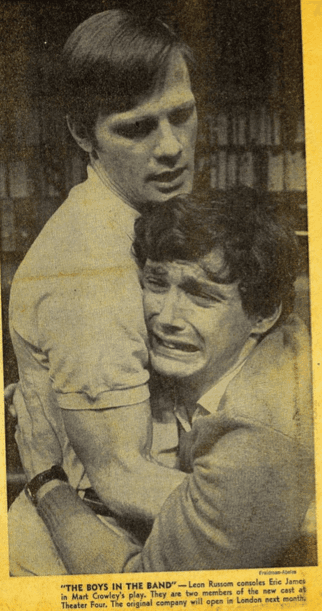
My picture then appeared on the front page of the New York Times, Sunday theater section. I replaced Kenneth Nelson in the starring role of Michael in The Boys in the Band. Stardom was within reach. I wondered what the Marienthals thought of my New York arrival following my Chicago departure.
After more than a year of touring Boys from New York through Las Vegas to Los Angeles, I badly needed a change. Delia and I moved to L. A. Guest shots followed on Columbo, Name of the Game, Ironsides, and Mission Impossible.
Producer-director Gloria Monty, responsible for the giant soap opera hit General Hospital, was set to cast Dean Martin’s son Dino in her new soap, Bright Promise. The Morris Agency slipped me in for a last minute audition late at night. Dino was out and I was in, soon to become Dana Andrews TV son. The show proved too old fashioned. All My Children, launched at the same time, was more hip. Sammy Davis was a regular viewer. NBC cancelled our Bing Crosby Production after a year. I was scorched and falling fast like a shooting star. Soon after, I retired my professional acting career of sixteen years. Delia and I began a family.
Did I let down the Marienthal brothers, Berenicki Robbins, or my Goodman teachers? I do not think so. Everything they taught me went to excellent use throughout my life. My subsequent starring roles, running international real estate brokerage companies, writing as a law journalist, and now as an historian, book author, and publisher reflects the opportunity they provided. I always have been mindful since to support arts education and to cultivate young talent.
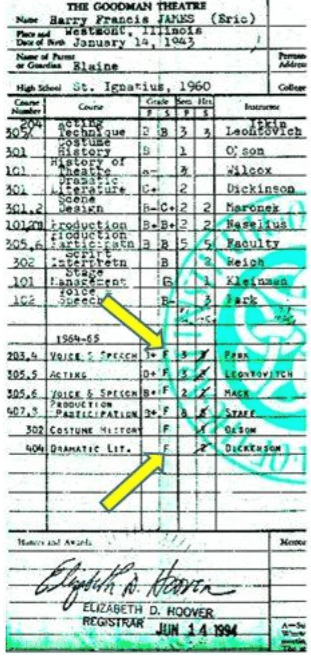
Everything evens out. In retirement, I began to collect the documents of my history for our family archives. I wrote to the Art Institute for my Goodman transcripts. What came back surprised me.
Goodman never gave the balance of my Marienthal scholarship to another. Instead, Goodman gave me all “F”s for the scholarship classes I never attended. Ah, show biz and social justice.
I do not know of anyone else who received a Marienthal scholarship. I had rather the Marienthal brothers’ scholarship program survived my shooting star.
ERIC F. JAMES is the awarding-winning author of Jesse James Soul Liberty, Behind the Family Wall of Stigma & Silence. Volume I is the first of Eric’s five-volume history of the family of Frank & Jesse James. Volume II, This Bloody Ground, will be published in late 2017. Eric also publishes Stray Leaves, his family’s official website and blog.
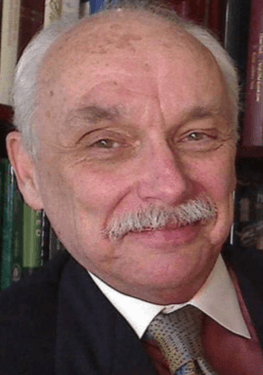
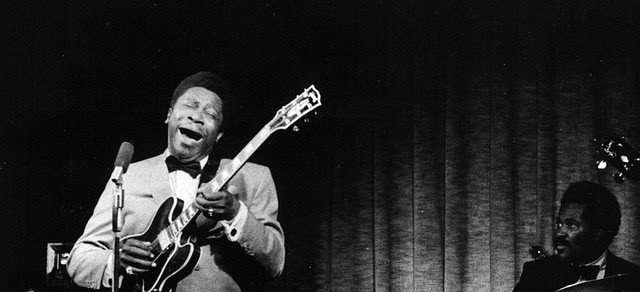
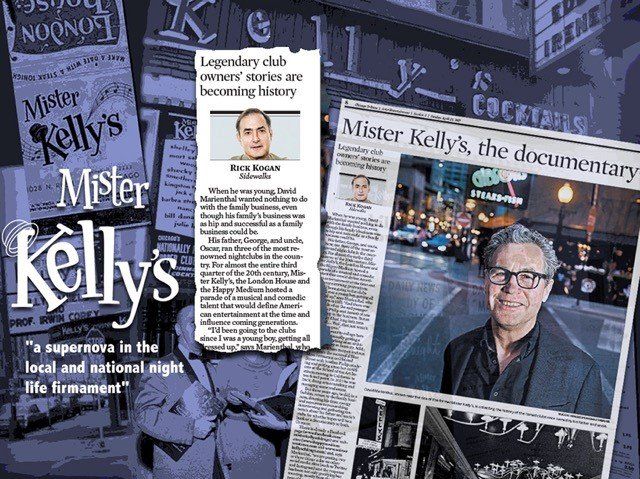
When he was young, David Marienthal wanted nothing to do with the family business, even though his family's business was as hip and successful as a family business could be.
His father, George, and uncle, Oscar, ran three of the most renowned nightclubs in the country. For almost the entire third quarter of the 20th century, Mister Kelly's, the London House and the Happy Medium hosted a parade of a musical and comedic talent that would define American entertainment at the time and influence coming generations.
"I'd been going to the clubs since I was a young boy, getting all dressed up," says Marienthal, who was born in 1951. "And there was some talk of us (he and younger brothers Philip and James) of one day getting in the business. But as a teenager I had long hair, torn jeans and …. Well, that just wasn't going to happen."
So off he went to college here and there, eventually getting a degree and working as an architect and builder in Sante Fe, N.M.; coming back here to open and run for 17 years the successful Blue Mesa restaurant on Halsted Street with brother Philip; studying and getting a teacher certificate at the School of the Art Institute; moving to California to teach and paint. In 2010 he was back, doing arts consulting and managing some real estate.
But three years ago, he did, in a fashion, return to the family business, devoting his time, energy and resources to researching, interviewing and gathering materials about his father and uncle's clubs for what he hopes will be a book or a documentary or both. Or more.
There is already a Facebook page ( www.facebook.com/misterkellyschicago ) and websites ( www.happymediumventures.com and www.misterkellyschicago.com ) and, says Marienthal, "we are posting two or three things a day on other social media sites (such as Twitter and Instagram) and the response has been not only gratifying but amazing, mostly from the 18-35 year old crowd."
This is how he puts a possible TV series — already with a script being pitched to producers — on his website:
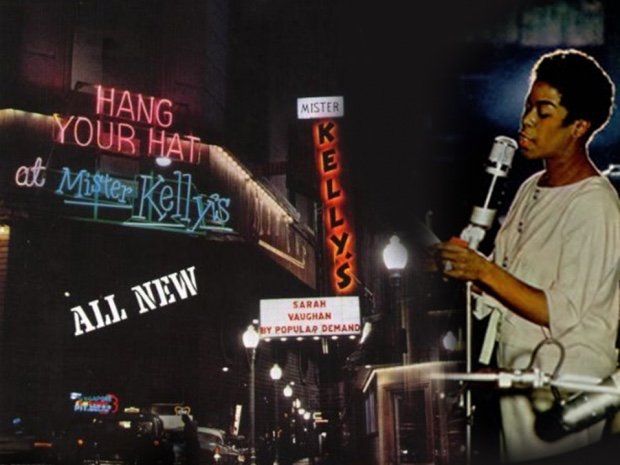
Join us to support the legacy of Mister Kelly's and the documentary film being produced by David Marienthal with WTTW Chicago Public Media, directed by Philip Koch.
This two-act concert features Kimberly Gordon, Sophie Grimm, Lynne Jordan, Frieda Lee, LaShera Moore, Daryl Nitz, Jeannie Tanner, and Ellen Winters. Musical direction by Andrew Blendermann, with Joe Policastro on bass, Phil Gratteau on drums. Special guest performance by a Chicago high school student protege from ChiArts.
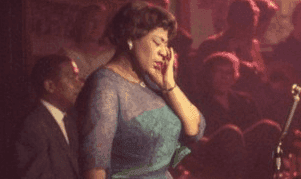
Happy Medium Ventures and Daryl Nitz Entertainment present:
Ella Live at Mister Kelly's: a benefit performance and preview for the documentary film, “Mister Kelly’s: Wasn’t It a Time?”
Monday, January 29, 2018
City Winery Chicago at 1200 W. Randolph Street, Chicago, IL 60607
$25-$40
For tickets go to Ella at Mister Kelly’s
Ella Live at Mr. Kelly's
On August 10, 1958, Ella Fitzgerald recorded her “Live at Mister Kelly’s” LP. In 2007 the concert was remastered and re-released in its entirety, including the early and late sets. This Ella centennial celebration concert presents the entire concert, without song duplication, of both sets. Featuring such songs as "Nice Work If You Can Get It," "The Lady Is a Tramp," "Summertime," "Witchcraft," "Come Rain or Come Shine," "Stardust," and many more from the classic American songbook of Gershwin, Rodgers & Hart, Porter, and others. Featuring Sophie Grimm, Lynne Jordan, Frieda Lee, Liz Mandeville, LaShera Moore, Daryl Nitz, Alina Taber, and Ellen Winters. Musical direction by Andrew Blendermann, with Joe Policastro on bass, Phil Gratteau on drums.
Mister Kelly’s: Wasn’t It a Time
Mister Kelly’s Once called a “supernova in the local and national night life firmament,” the legendary Mister Kelly’s illuminated legendary Chicago’s Rush Street, and the entire country, by launching talent like Barbra Streisand, Woody Allen, Bette Midler, Herbie Hancock, and Richard Pryor. It’s visionary owners George and Oscar Marienthal smashed color and gender barriers to put fresh, irreverent voices on stage and transform entertainment, as America knew it in the 50s, 60s, and ’70s.
Now, with the club long gone, and its star talent reaching its golden years, George’s son David, goes on a quest to collect the memories of the clubs before they are lost. Celebrity interviews now include Bob Newhart, the Smothers Brothers, Dick Gregory, Lainie Kazan, Dick Cavett, Shecky Greene and Ramsey Lewis. Interviews with dozens of local musicians, staff, family, and patrons provide a delightful balance with engaging stories, rich with vintage detail. Discussions are underway to interview Woody Allen, Lilly Tomlin, Bette Midler, Barbara Streisand, Steve Martin and others.
The film will portray through interviews, live footage, photos, music, and song, the most beloved and famous talent of our time at the decisive moments when they showed up, dug deep, and broke in. How do you change the world with a laugh and a song? Find out in a film that documents the rise and fall of one of American entertainment's great proving grounds.
Check out the hot sizzle reel and read Rick Kogan’s story in the Chicago Tribune and the links below for more about this exciting new film.
• Chicago Tribune Story: http://trib.in/2pZT07H
• Website: http://www.misterkellyschicago.com
• Facebook : https://www.facebook.com/misterkellyschicago
Happy Medium Ventures is the leading curator and steward of legendary Chicago nightlife venues, London House, Mister Kelly’s, the Happy Medium, and the Rush Street scene, from 1946-1970’s; the epicenter of Chicago’s entertainment scene. Today, Happy Medium Ventures is reviving this bygone era for a new generation of fans through an unprecedented collection of photos, recordings, press clipping. First-person interviews include key players in the Rush Street scene — from celebrity performers at London House, Mister Kelly’s and other Rush Street venues, to the employees behind the scenes, patrons of the nightspots, family and friends. Happy Medium Ventures aims to capture the fun and excitement through a documentary film, a new TV series, vibrant social media and other original content about this captivating chapter of Chicago history.
Daryl Nitz Entertainment is an event-concert production company specializing in shows that celebrate cultural anniversaries and historical recreations. Operating since 2004, with such show as “Judy at Carnegie,” “Voices of Chicago,” “Ladies Sing the Blues: a centennial birthday concert for Billie Holiday,” “It Was a Very Good Year: a centennial birthday concert for Frank Sinatra,” “Above Us Only Sky: John Lennon at 75,” “That’s Amore: a Dean Martin centennial celebration” and many more.
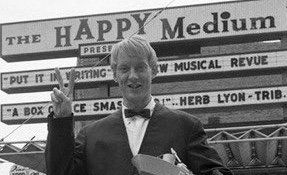
The
Mister Kelly’s team is overwhelmed by the incredibly talented and generous
people that we have met, while creating our archive of the Marienthal Brother’s
legendary nightlife empire. From colorful Rush St. regulars to famous
performers, and everyone in-between, it has been a thrill. One of the most exciting encounters has been
working with the renowned photographer, Art Shay. At the age of 95, Art is truly a legend in
his own time.
Shay began his career as a writer and journalist, but after showing a great eye for capturing images, soon transitioned into a career as a photographer. Based out of Chicago, he became one the nation premier photographers, working for major publications such as Life, Time, and Sport Illustrated. Art Shay photographed everything, from historic moments (1968 Democratic Convention) and iconic personalities (Muhammad Ali, The Rat Pack, President Kennedy), to street photography that captured the everyday life of average Americans. In the process he became one of the most celebrated artists of his medium and a Chicago legend.
In light of this, we were honored when Mr. Shay was kind enough to donate one of his brilliant works to our project recently. The print is a wonderful slice of Chicago’s Rush Street from the 1960s. The photo was taken outside of The Happy Medium and features actor Tom Williams dressed as a child, holding a toy boat.
Why is a grown man dressed as a child? Why a toy boat? Well, this can be explained. Tom Williams was part of was a comic review, produced by the Marienthal Brothers, called Put it In Writing . In the political satire, Williams plays America’s youngest president (an obvious nod to the newly elected JFK), who still has some childlike features. Put it in Writing would become the biggest play to originate at The Happy Medium and, after a long run in Chicago, it eventually made its way to New York for an off-Broadway production.
We are humbled to receive this generous gift from such a preeminent artist. The photo is a brilliant image of mid-century Chicago history, from one of the men who documented it best. The photo will be cherished and used in our mission to record this unique piece of Chicago and American history. We wish to give a heartfelt thank you to our friend Art Shay, who contributed this beautiful photo to the Mister Kelly’s archive.
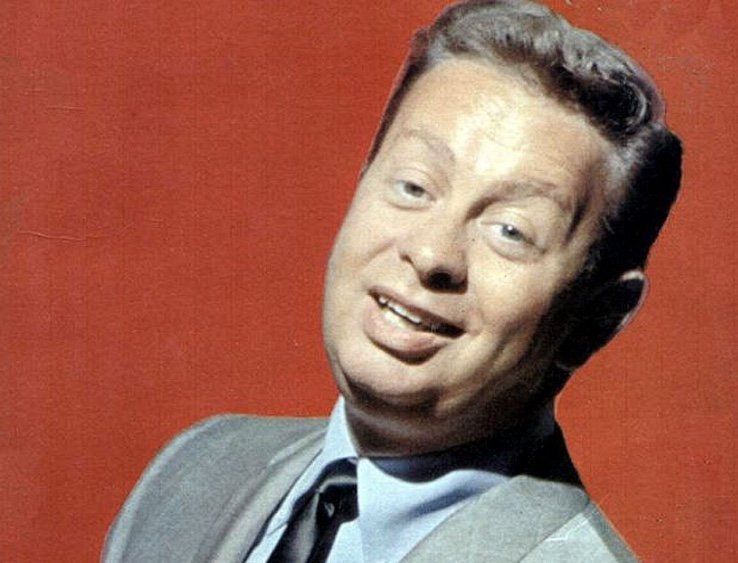
Guest Blogger Sam Fazio is a popular Chicago vocalist. He writes about Chicago’s own Mel Tormé, who appeared at Mister Kelly’s many times over the years.
A Kid from the South Side
Born Melvin Howard Tormé in 1925 on the south side to Jewish Russian immigrants, he started singing at a very young age of four with the Coon-Sanders Orchestra, performing at Chicago's Blackhawk restaurant. He continued his early career on radio series, playing drums and writing songs—all before high school graduation.
